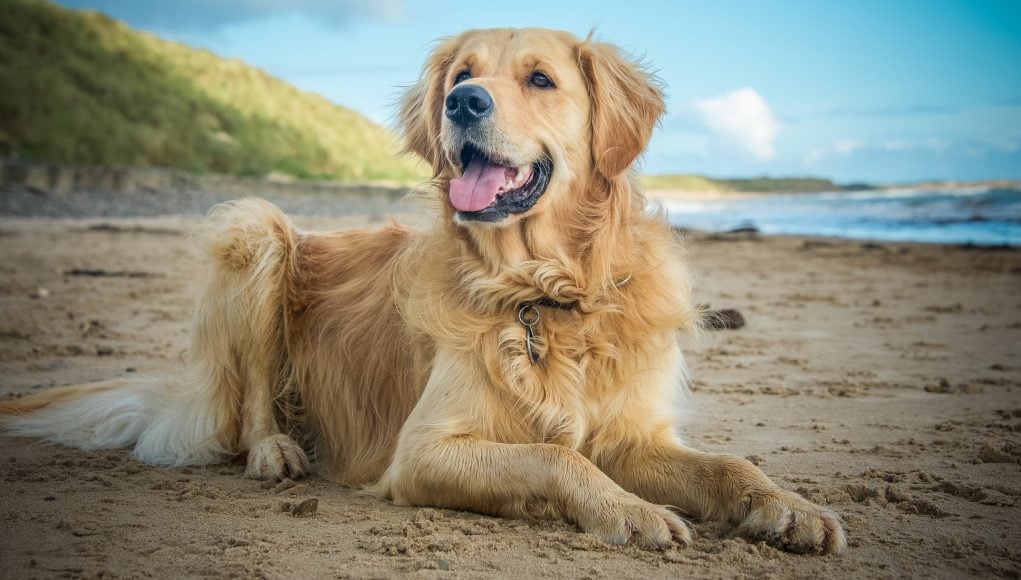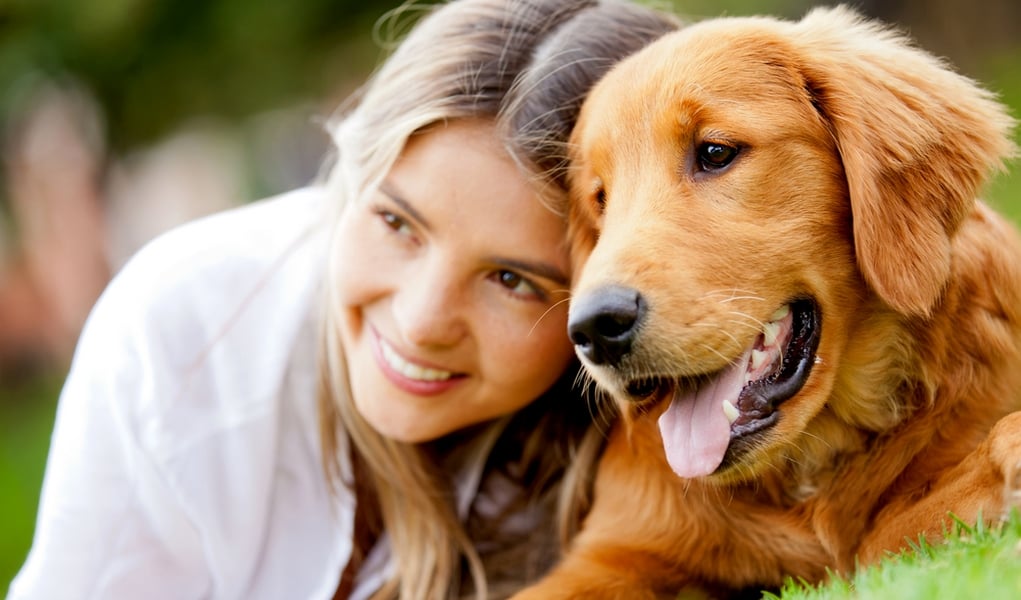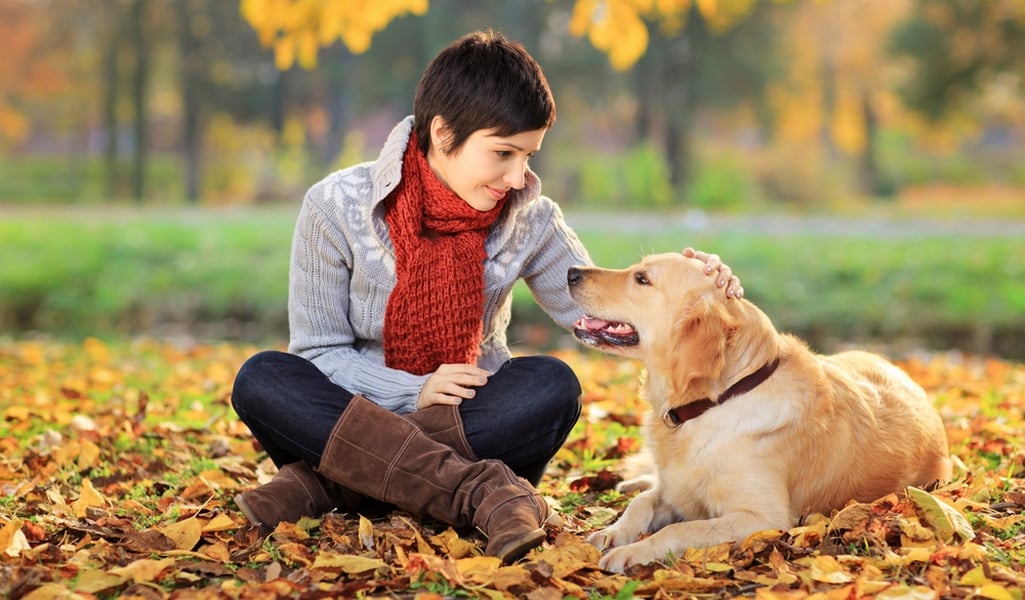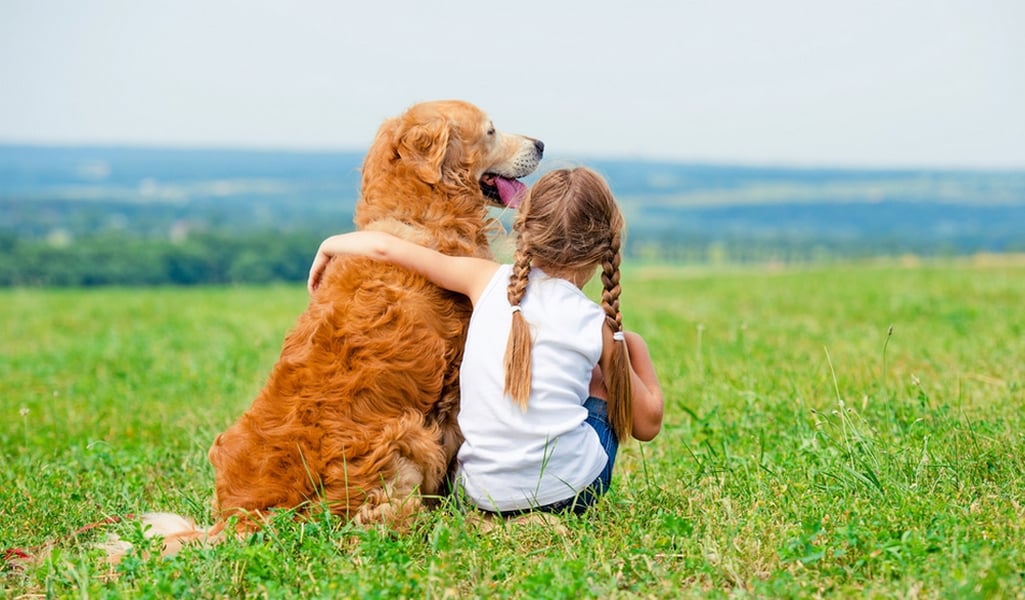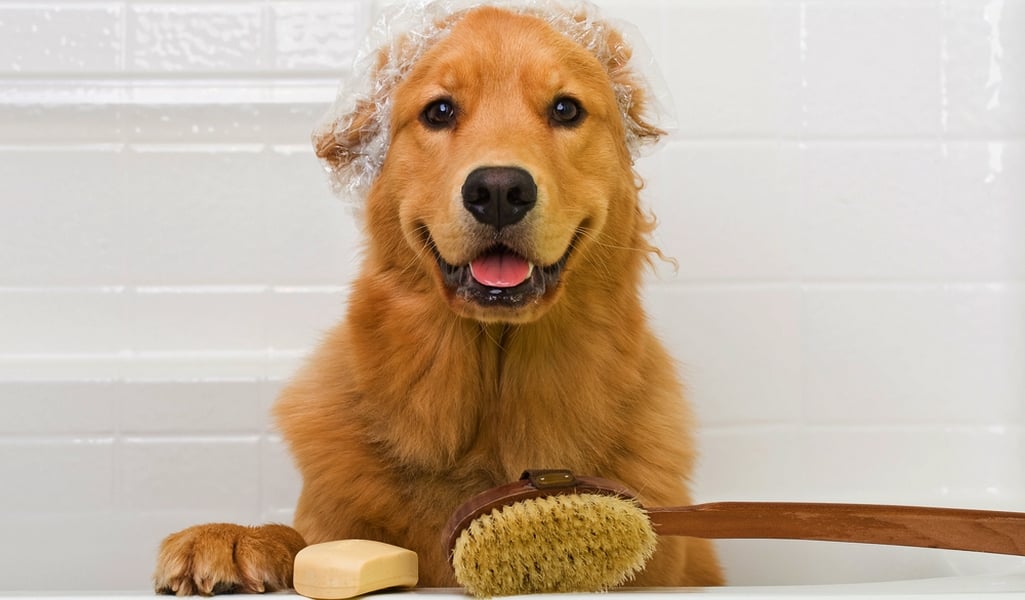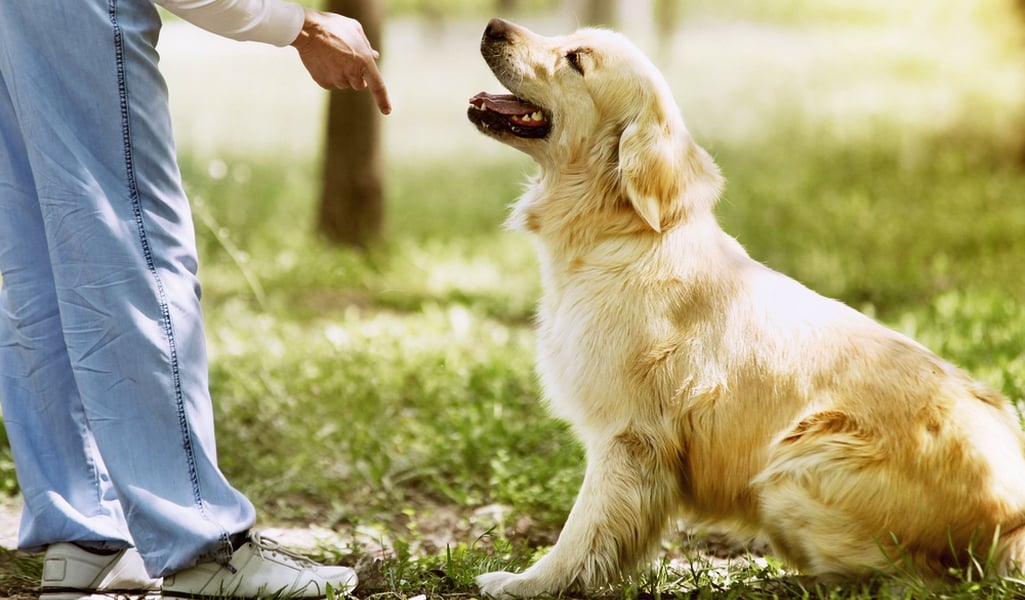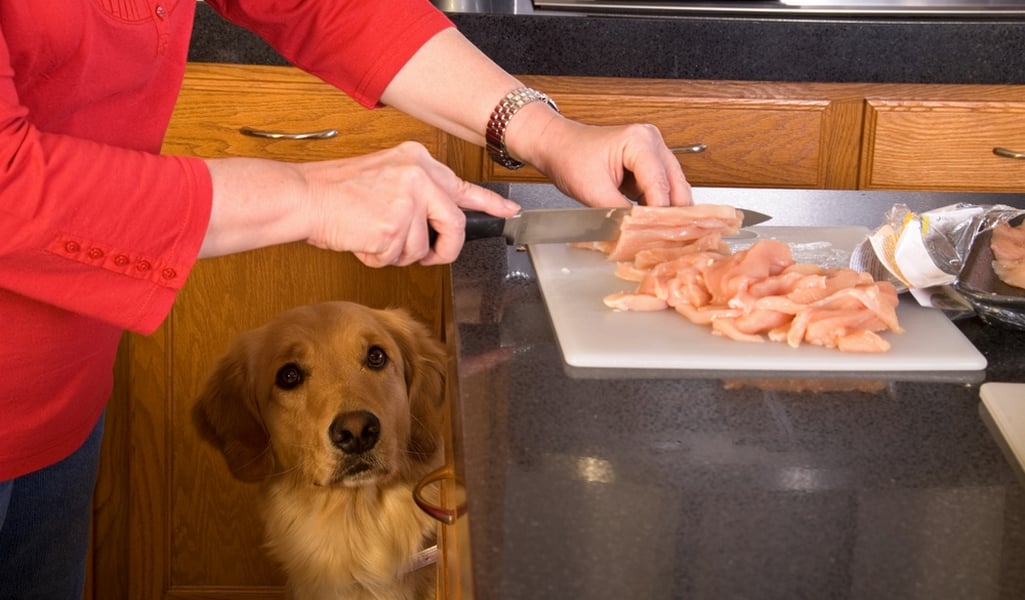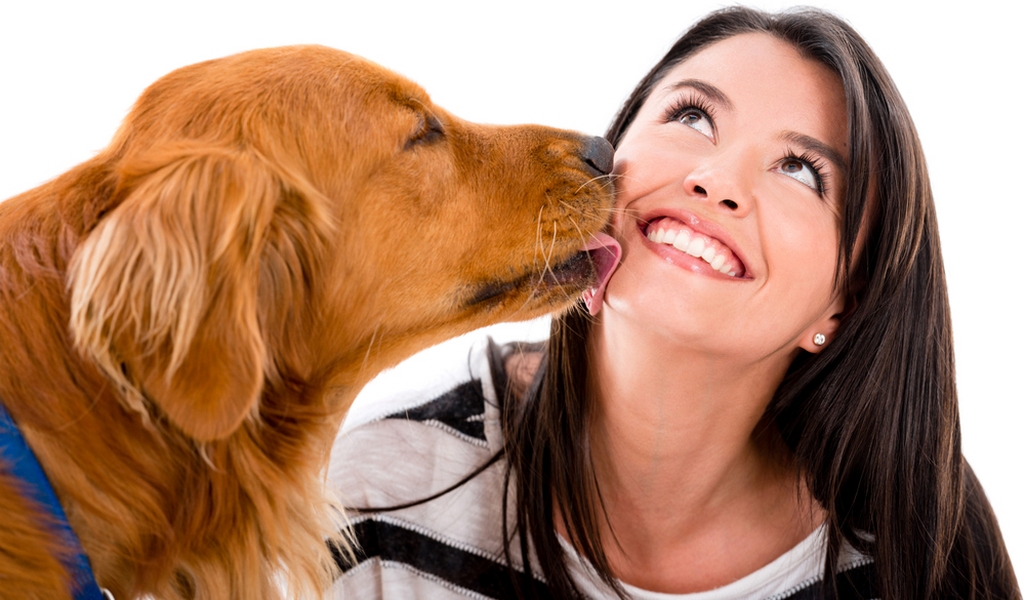Table of Contents
- Main Characteristics of Golden Retrievers
- Best-Known Golden Retriever Facts
- Golden Retriever History
- Golden Retrievers General Health and Common Ailments
- How To Groom A Golden Retriever
- How To Train Golden Retrievers
- What To Feed Golden Retrievers
- How are Golden Retrievers with Children?
- Where To Adopt Golden Retrievers and Golden Retriever Puppies?
The Golden Retriever, also known as a Golden, is one of the most popular dogs in the United States. They are currently ranked 3rd on the popularity scale of the American Kennel Club.
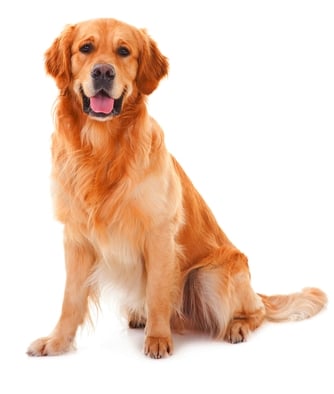 With their loving smile, deep eyes and silly exuberance, Golden Retrievers have made families all over the world enjoy the benefits of having a family dog. They are considered to be a large breed with medium energy, so they do need a family that is active and able to incorporate their dog into the daily routine and activities.
With their loving smile, deep eyes and silly exuberance, Golden Retrievers have made families all over the world enjoy the benefits of having a family dog. They are considered to be a large breed with medium energy, so they do need a family that is active and able to incorporate their dog into the daily routine and activities.
These dogs don’t do well when left alone for long periods of time. They enjoy spending time with their family and going for adventures. If you enjoy swimming, hiking, biking or walking with your dog, the Golden Retriever will be a good fit for your family.
Fans of this breed love the Golden's unmistakable appearance and their affectionate nature. A Golden will make himself known when visitors arrive at your home, but it won't take him long to warm up to the new faces. These dogs love to play with people and receive attention.

Main Characteristics of Golden Retrievers
These large breeds dogs make great family pets. They enjoy being around children and soaking up all the attention they can get. It's really no wonder they are one of the most popular dog breeds.
Golden Retrievers are smart, making them easy to train. They love to have a job to do, which is why they are also commonly used as service dogs. Their loving nature pairs perfectly with their high intelligence to make this breed a great candidate for a working dog.
Many owners love the Golden's beautiful, long coat. It's certainly one of their distinctive features, however, it requires a lot of grooming. Without daily brushing and proper maintenance, this dog's coat can become matted and tangled very quickly.
Size of Golden Retrievers
Golden Retrievers are part of the large breed category. They can stand between 21.5 to 24 inches tall at the shoulder and can weigh between 55 to 75 lbs. Like all other breeds, females tend to be on a smaller scale than males.
Lifespan of Golden Retrievers
Many things can affect how long your companion will stay with you – how well he's exercised, how much he eat, and even genetics. Most Golden Retrievers will live to the age of 10- 14 years old. Keeping your dog in optimal shape can add a couple of years to his life while letting him become obese can take years off of it. The less strain that he has on his body, the happier and healthier he will be.
Physical Characteristics of Golden Retrievers
Golden Retrievers are named such because all of them have the coloring of a gold coat. Their golden coat can come in many different shades, but it will be of a golden hue. Their coats, as long as they are groomed properly, are lustrous, shiny, and sleek. Their coats can also be either straight or wavy. Some Golden Retrievers have longer hair than others.
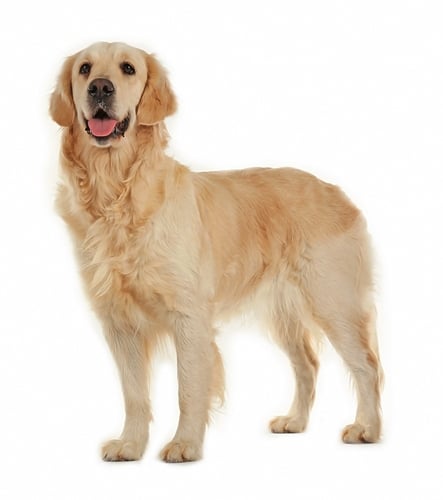 One characteristic they all have is a double layer coat; a water-repellent outer coat that is dense and a thick undercoat that will help to keep them warm in the colder weather. These coats combined will help to keep the dirt and debris off of the dog's skin and also make the water just slick off their fur.
One characteristic they all have is a double layer coat; a water-repellent outer coat that is dense and a thick undercoat that will help to keep them warm in the colder weather. These coats combined will help to keep the dirt and debris off of the dog's skin and also make the water just slick off their fur.
RELATED ARTICLE: Labrador Retriever Breed Profile
Golden Retrievers have a broad skull, but none of their bones will protrude. They have an aerodynamic design for their head. Their muzzle is medium length and blends smoothly into their skull.
When looking into the face of a Golden Retriever, you should see a happy dog that is looking for some loving and eager to please. You will see a dog that will enjoy some affection. When you look into their eyes, they will appear to be alert and self-confident. Goldens have fairly large brown eyes that make you just want to fall in love with them.
Their heads sit on a medium-length neck that eases into their shoulders. Their necks should be sturdy and muscular and able to handle their play and work. A Golden Retrievers' jaws are strong, and they are able to pull at trees, tires, or anything else you have for them to play and work with.
The Golden Retriever has a sleek-looking body. They are strong but should not be robust looking, or have a barrel chest. They will have a nice long, straight back with legs that are straight and slim. Their dewclaws should be left on. Their feet are medium-sized and will have thick pads on them.
They have a nice long tail that will have a lot of feathering of hair coming off of it. It will fan out. When they are alert or in action it should be level with their backs or with a slight curve up. The tail should never curve over their back. When at rest it may hang down. A Golden's tail will be thick at the base and taper off to a point at the end.
Living Arrangements for Golden Retrievers
Golden Retrievers are medium-energy dogs. They need a home that is active and will have lots of time to be around their family. They’re best suited for active singles, couples, and young families. They should be included in all of your family events.
These dogs are best suited to a home where someone will be home with them most days.
Golden Retrievers do not like to be left alone for long periods of time. They love being able to go with you when you have to leave. They want nothing more than a nice family drive or to go out for a hike.
Golden Retrievers can live in any living condition – city, suburb, or rural – just make sure that they know their boundaries and give them daily exercise to keep them happy.
Best-Known Golden Retriever Facts
Golden Retrievers are in the large breed family and are just big, loving teddy bears. They want love and affection and just want to be close to you. Golden Retrievers just want love – love from you, love from other people, love from other animals, love from anywhere they can get it.
This breed wants to be close to humans and enjoy a good playtime, pat, or just be cuddled on the couch. Wherever you are is where they want to be. They also enjoy being around other animals. This is a great breed for dog owners with other canines or cats in their homes.
Golden Retrievers are born socialists. They want to be around everyone. If they’re left alone, they’ll go and find someone that will shower them with affection, and with their lovable-looking face and easy-going personality, it’s not hard for them to find someone to give them the attention that they’re seeking.
No matter what the Golden Retriever is doing, they’re good at it.
They are very intelligent and quick to learn. Golden Retrievers are fantastic as working dogs. Many of their jobs include guide or therapy dogs, search-and-rescue jobs, and drug sniffing. They’re also used while hunting for retrieving, hence the name.
Goldens are also fantastic swimmers, so they can be taught to do different retrieving jobs in the water as well. If you’re looking for a dog that you can work with on agility training or competitive obedience, this is a breed to look at.
This dog needs a job, so make sure to give him one. Even if it’s getting the newspaper or waking up the kids in the morning, Golden Retrievers aim to please. The best Golden Retrievers are tired Golden Retrievers.
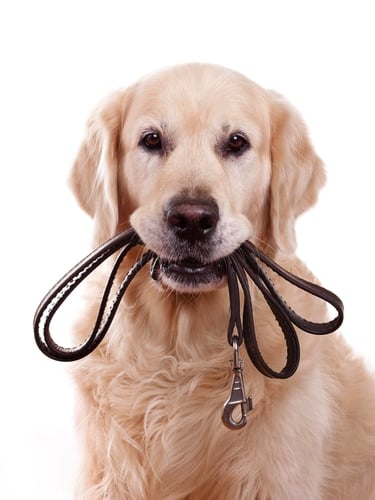 This breed needs to have something in their mouth – a ball that they want to play catch with, a newspaper that they just fetched, or a bone to gnaw on. If they don’t have something safe that they’re allowed to chew on, you may find that they will come up with their own chew toy, which could include your shoes, furniture, or kids' toys.
This breed needs to have something in their mouth – a ball that they want to play catch with, a newspaper that they just fetched, or a bone to gnaw on. If they don’t have something safe that they’re allowed to chew on, you may find that they will come up with their own chew toy, which could include your shoes, furniture, or kids' toys.
Teaching your Golden Retriever what is acceptable to chew on is very important since he will crave something to chew or just to carry around in his mouth. Make sure to have lots of toys that are durable and made available to him.
If you’re looking for a scary guard dog, keep looking. If you’re looking for a dog that will let you know that someone is in your yard but also give them a happy greeting, then this is the canine for you. Goldens are more likely to bark in welcome while they approach a stranger in order to get a pat. You’ll know that someone is in the yard, but they’re not very likely to be scared off.
ADDITIONAL READING: 14 Best Watch Dogs & Breeds That Are Good Guard Dogs
If you’re wondering if you can have multiple dogs in your home, your Golden Retriever will tell you, “Sure thing! Bring them on! I like new friends!” Golden Retrievers are very passive and just want to have fun. They can get along with almost any other dog. Even some dogs that can tend to be aggressive should be fine with a Golden Retriever, as long as they are introduced properly and safely.
Having multiple dogs in the house can ensure that they are always tired from playing with their friends. Just make sure there’s nothing on the floor that can be broken while they are playing. Golden Retrievers can also benefit from having a nice big fenced-in backyard where they have lots of room to jump and bounce around.
Are you thinking of having other animals in your house besides dogs? Maybe cats, rabbits, or even turtles? The Golden Retriever doesn’t care what their new friends are as long as they’re friends. Make sure to give proper introductions to the smaller animals. Your Golden needs to know that this is a friend, and no, this is not food.
There have also been many Golden Retrieves who have had their 15 minutes of fame on the big screen. The biggest well-known series of movies that you will find that is full of Golden Retrieves is the Air Bud series. They have played basketball, soccer, traveled all over the world, and even found Santa Claus. These dogs have had such a great reception that they keep making new movies with the breed.
Golden Retriever History
In as early as 1835, Lord Dudley Marjoribanks, the first Lord Tweedmouth, started breeding a dog that would be a great retriever while he was hunting. He also wanted an even-tempered dog that would be a good companion in the home.
Lord Dudley Marjoribanks is most commonly referred to as Tweedmouth. He owned an estate called Guisachan (pronounced Gooeesicun) near Inverness in the highlands of Scotland. He was using the common setters and spaniels of the time for his hunting but was finding that he wanted a dog that was more attentive to their master than what these dogs were doing.
In 1868, Tweedmouth took a dog named Nous who was a yellow wavy-coated retriever (a descendant of the small Newfoundland and the earlier Labrador breeds used by fisherman) home to breed with his dog Belle who was a Tweed Water Spaniel. This breed has since become extinct.
Belle came from a breed that was eager to retrieve while out hunting and was also a great companion in the home. In 1871, Nous and Belle were bred for the second time.
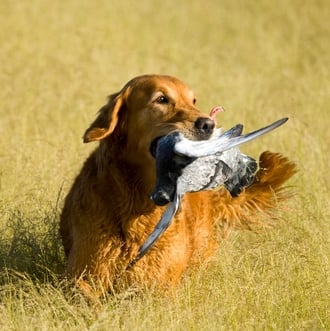 Tweedmouth would keep the yellow pups from these litters to continue working on his breeding program. The other puppies would normally be given to friends and family. The yellow puppies that he would keep would continue breeding with other wavy or flat-coated retrievers, other Tweed Water Spaniels, and a red setter. He always kept the dogs that he wanted to continue breeding and give away the others.
Tweedmouth would keep the yellow pups from these litters to continue working on his breeding program. The other puppies would normally be given to friends and family. The yellow puppies that he would keep would continue breeding with other wavy or flat-coated retrievers, other Tweed Water Spaniels, and a red setter. He always kept the dogs that he wanted to continue breeding and give away the others.
By the 1900s, Lord Tweedmouth’s sons brought the first Golden Retrievers over to America. They were not registered with the Kennels at that time. They were, however, valued for their abilities in being a great asset when taken out hunting and also for their good-natured temperament inside the home. They then went on to be great competitors in dog shows and obedience competitions.
In 1904, Don of Gerwyn, a liver-coated descendant of the Tweedmouth stock, won the International Gundog League trial. He is one of the most well-known dogs of his line for this accomplishment. In 1908, Golden Retrievers, then known as Flat Coats (Golden), had their first debut in England at the Crystal Palace show.
In 1911, England’s Kennel Club recognized them as “Retriever – Yellow or Golden”. Their name was later changed to “Retriever – Golden” in 1920. In 1925, the American Kennel Club recognized the Golden Retriever. In July 1977, the American Kennel Club had its first Obedience Championship. The first 3 dogs to achieve the title of Champion were all Golden Retrievers.
There have been many Golden Retrievers who have spent time in the limelight. Several of these dogs have spent time on the sets of “Homeward Bound”, “Air Bud” and their spin-offs, as well as the TV show “Full House.”
A Golden named Liberty spent her time playing at the White House with President Gerald Ford. She was a gift from Ford’s daughter, Susan. Liberty spent most of her time lounging in the Oval Office or playing in the pools at Camp David.
Golden Retrievers General Health and Common Ailments
Golden Retrievers, as a whole, are very healthy. There are some issues that can arise with them, and some dogs are more prone to these issues than others. Always make sure to go through a reputable breeder who screens their dogs for these genetic issues.
Hip Dysplasia is a common problem that can occur in Golden Retrievers. This is a genetic disorder that is caused when the thighbone doesn’t sit in the hip socket properly. This can cause lots of discomfort and hinder them from getting around. Severe arthritis can occur as well, but it can be corrected with some costly surgery.
Along with Hip Dysplasia is Elbow Dysplasia, which can occur as well. This is when the joints in the leg don’t line up properly and can slip out of the socket.
Golden Retrievers are sometimes referred to in the veterinary field as Cancer Retrievers. They are known for getting many different forms of cancer. Some forms of cancers that are common are hemangiosarcoma, lymphosarcoma, mast cell tumors, and bone cancer.
The cancer treatments can become very costly and can cause a financial and emotional drain on you and your family. Make sure to have lots of checkups with your vet to catch any signs of cancer as early as possible.
Golden Retrievers can have an issue on the heart called subaortic stenosis. This is when the aorta narrows, restricting the blood that is carried away from the heart. This can usually be detected in the early stages as a slight murmur. Unfortunately, it has been known to cause sudden and instant death in canines, including dogs that are early in their years. Make sure to have the heart checked at all of your yearly vet visits to catch any early signs.
Early cataracts are also known to be an issue in Golden Retrievers. This is normally a genetic issue, so make sure that the parents have been tested for cataracts before buying your new puppy. The parents of the puppy should be registered and certified with the Canine Eye Registry Foundation. You'll find more information about this later in this Golden Retriever Breed Profile.
How To Groom A Golden Retriever
Golden Retrievers have a water-repellent double layer coat that is dense. These dogs shed, shed, and shed. In order to keep the amount of hair that will be flying around your house down, make sure to do daily brushing. With their undercoat, you’ll want to even do double brushing a day during the change of the seasons.
You’ll want to bathe your Golden Retriever about once a month to keep his coat clean and rid of any debris that can get stuck in it. After a swim in the lake or pool make sure to wash him down with some freshwater to get rid of any dirt, debris, or chlorine that can be harmful to his coat.
Ears
Golden Retrievers have folded over ears, which can cause a lot of issues with ear infections and bacteria if they’re not checked regularly. Make sure that after you are done swimming you wipe out his ears with a soft cloth. About once a week check for wax build-up, redness, or an odor.
You can use a warm, wet cloth to wipe away any excess wax build-up. You can use a cotton swab on the inside of the ear but never go into the ear canal – this can cause more issues than you’re trying to fix. If you find that your dog is getting an extreme amount of build-up in his ears, consult your vet about using a cleanser on them. These cleansers can help reduce the amount of wax build-up.
Nails
Your Golden Retriever may not be able to wear his own nails down with just exercise. Make sure to clip or grind the nails on a regular basis. You should not be able to hear the nails go click, click, click as he walks through the house.
If their nails become too long this can cause them to crack or break. Even worse is having them get caught on something and rip off, this will mean a trip to the vet to get stitches at the very least.
FURTHER READING: Dremel vs. Safari vs. Epica: Comparing Best Pet Nail Clippers for Dogs
Teeth
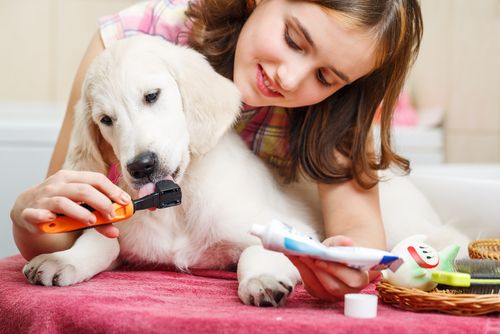 Oral care is very important for helping your dog keep all of his teeth. You can brush his teeth on a regular basis and also use teething products such as antlers and cow bones to keep the plaque and tartar from building up. Teething treats and chews are not an acceptable substitute for regular brushing, though.
Oral care is very important for helping your dog keep all of his teeth. You can brush his teeth on a regular basis and also use teething products such as antlers and cow bones to keep the plaque and tartar from building up. Teething treats and chews are not an acceptable substitute for regular brushing, though.
Working away the extra plaque and grime that gets stuck on his teeth will help to keep them healthy. Golden Retrievers tend to need something in their mouth, so make sure to give them something that can work away at the plaque on their teeth while they chew.
Obesity
Obesity is a very easy problem to keep in check, and it’s also very easy for your dog to become. Making sure that he has an adequate amount of exercise and not an excessive amount of food will make sure that your Golden stays at a healthy weight.
If your Golden Retriever is too heavy for his frame, it can cause even more joint issues. This will make it hard for him to walk and get around.
How To Train Golden Retrievers
Since Golden Retrievers will grow to be such big dogs, it’s really important that they have early training and learn how to behave. Fortunately, they are so eager to please that training them is usually fairly easy. With some devotion from you as well as your time, a Golden Retriever can learn the ropes very quickly and will be eager to move on to the next step.
During your training sessions, work on a job that your Golden Retriever can do for you. If you want a pet that will fetch and release, work on that. If you want your dog to do search and rescue, work with them to find things from a scent.
Other good training exercises are obedience and agility training. These activities keep your dog mentally stimulated and physically exhausted. They will help him grow to be a well-rounded pooch.
If your Golden Retriever is not properly trained, exercised, or socialized, he can be very scary to skittish adults and some children. It's not that your dog is trying to scare them, just that they are so big and it is easy in their excitement to knock over the elderly as well as kids.
Exercise
Your Golden Retriever requires mental and physical stimulation on a daily basis. You should have him exercised for at least an hour every day. Depending on your schedule, you can break this up to a few different exercise times throughout the day.
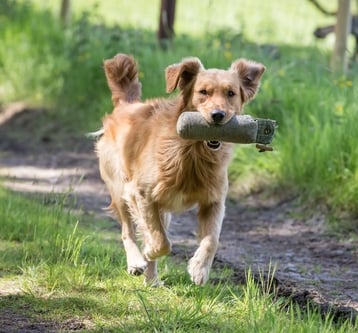 Although your puppy may want to go full force while he is playing, you need to keep his play tamed for the first 2 years. The growth plates are still shifting and forming in the first 2 years of his life, so make sure that your puppy doesn’t jump too high or that he doesn’t run full force to keep the growth plates from shifting wrongly.
Although your puppy may want to go full force while he is playing, you need to keep his play tamed for the first 2 years. The growth plates are still shifting and forming in the first 2 years of his life, so make sure that your puppy doesn’t jump too high or that he doesn’t run full force to keep the growth plates from shifting wrongly.
When looking at exercises to do, you should do most of them either in the water or on the soft grass. Don’t go jogging or running with your pup just yet. A nice walk on pavement won’t hurt him, you’re just trying to avoid any jolts on his body.
There are many different exercises that you and your dog can enjoy. Your Golden Retriever will enjoy any exercise you want to do, including hiking, jogging, swimming, agility, obedience, or anything else that you can think of.
Look for some puzzle games that you can give your dog for those rainy days when it’s hard to get outside. Mental stimulation can sometimes be just as tiring as physical exercise for your pet. Keep puzzle games around that he can work on when he's bored.
If all else fails, get your child or the neighborhood kids to come over and play fetch in a safe area away from the road. It can give the kids and your dog hours of entertainment.
What To Feed Golden Retrievers
Healthy nutrition is very important to keep your Golden Retriever lean, trim, and healthy. When they overeat, this breed can become obese. Canine obesity causes a lot of strain on the dog's joints and organs. This will increase their chances of having hip or elbow dysplasia.
Keep your Golden Retriever to just dog food (the higher the grade, the better), and keep the table scraps away. Most dog food manufacturers have specific types of products for the different breeds, or at least for a small dog versus a big dog.
RECOMMENDED READ: Expensive Dog Food Brands: Are They Worth the High Cost?
You'll need to buy food for large dogs. You’ll also want to watch out for the number of fillers that are in the dog food brand you choose. Go for meats over grains when picking your pet's diet. Your Golden Retriever should get 2-3 cups of food a day, split into 2 meals.
Best Dog Food for Golden Retrievers
Choosing the best food for Golden Retrievers is crucial, as it will meet your dog's unique individual nutritional needs. A conversation with your vet or a canine nutritionist will teach you about the proper requirements of a Golden and which canine diet may be best for your Fido.
Keep in mind that all Golden Retrievers will have different nutritional needs depending on their age, weight, and any health conditions they may have. Here are quick picks for the best dog food for Golden Retrievers:
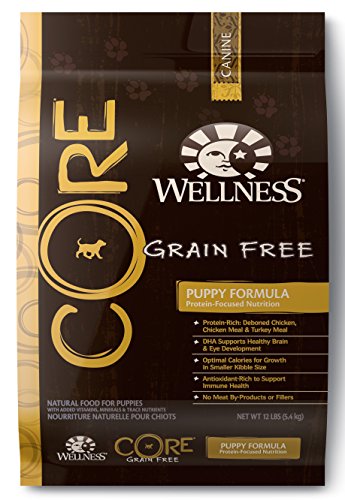 Wellness CORE Natural Grain-Free Dry Dog Food
Wellness CORE Natural Grain-Free Dry Dog Food- Fromm Adult Gold Premium Dry Dog Food – Chicken Recipe
- Merrick Grain-Free Recipe Dry Dog Food
- Evanger's Grain-Free Chicken with Sweet Potato & Pumpkin Dry Dog Food
- NUTRO NATURAL CHOICE Large Breed Adult Lamb& Rice Dry Dog Food
- Hi-Tek Naturals Grain Free Adult Dog Food
You can find more information on the best dog food brands in this review.
How are Golden Retrievers with Children?
Golden Retrievers love kids. They're humans and they like to play; what’s not to like? They are also strong and sturdy dogs, so they’re able to take all the love that small children will dish out. What about older kids? Golden Retrievers think they are fantastic! Older children give them someone to throw the ball!
In their excitement, Golden Retrievers can forget that smaller children aren’t always sturdy on their legs. They can bump into them, knocking them over. Trying to teach your dog to be careful around babies and toddlers can be important, but as the kids grow up, they will soon become fast friends, and your golden will want to tag along anywhere the kids go.
Where To Adopt Golden Retrievers and Golden Retriever Puppies?
There are three different ways to acquire your new Golden Retriever. You can go through a Breeder, an adoption shelter, or through clubs. Just be sure that the avenue you choose is reputable.
Breeder
Looking for a reputable breeder should be of your highest concern when looking to purchase your new puppy. Look for someone who is interested in you, your family, and how you live. You’ll want a breeder who is interested in the welfare of their pups and where they are going to be placed.
Reputable breeders will also make sure that the adults are well taken care of, that the pups are well-socialized, and that the litters are in a clean and safe area. Your breeder should be open and honest about the different diseases that are genetic in the Golden Retriever, and they should have several different tests done on the puppies before you get them.
These tests should be registered with the Orthopedic Foundation for Animals (OFA). Tests should include hip dysplasia and elbow dysplasia. They should also have their eyes tested through the Canine Eye Registry Foundation.
You can check that these tests have been done and what their results are on the OFA website. Keep in mind that all results are available on the OFA website, not just the passing tests. Make sure to check your score before adopting your new puppy.
You can find many reputable Breeders that are registered with the American Kennel Club. Another place to find reputable breeders is at the Golden Retrievers Club of America.
Adoption Shelter
Unfortunately, for many different reasons, Golden Retrievers cannot always stay in their home. This does not mean that they are bad dogs or even that it’s a problem with the dog.
 Some could have come into the shelter due to a breakdown in the home or the passing of a loved one. Many of these dogs are great and just need a new forever home. And let’s face it, you can skip the puppy stage by doing this.
Some could have come into the shelter due to a breakdown in the home or the passing of a loved one. Many of these dogs are great and just need a new forever home. And let’s face it, you can skip the puppy stage by doing this.
There are many great sites that you can go to and find your new companion, and of course, you should try to find out as much information as you can about these dogs. You’ll also be able to see easier if there are any issues in older dogs. Hip dysplasia and other genetic defaults will be more prominent in an older dog.
Some sites to check out are
- Golden Retrievers Club of America’s Rescue Network
- Golden Retrievers Club of America, Inc., National Rescue Committee
Clubs
The Golden Retrievers Club of America is a great place to gather information on where to find and acquire your new Golden Retriever. They will also help you with any questions that you may have about your new dog or about any breeders. They are an excellent resource to find reputable breeders or dogs that are in need of help.
What to look out for?
When acquiring your new puppy, you want to, first and foremost, stay clear of puppy mills. These places are just in it for the money and don’t actually care for the well-being of the dogs or where they are going to be placed. Other signs of puppy mills are how the dogs are housed and how many litters are on the go at any given time.
Other sure signs of wrongdoing are when there are no papers available for your new dog (unless you are getting a shelter dog under certain situations). All new puppies should have their shots and be tested by vets and professionals before they can be given out.
Puppies should never be taken away from their mothers before they reach the age of 8 weeks. They need this time to learn proper socialization skills and also have time for all of their checkups. Make sure to visit your vet within days of getting your new dog. They will be able to go over your pup and check their health.
Disclosure: We may earn affiliate commissions at no cost to you from the links on this page. This did not affect our assessment of products. Read more here and find full disclosure here.


